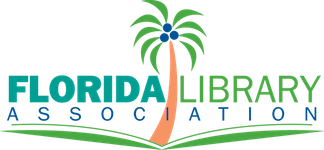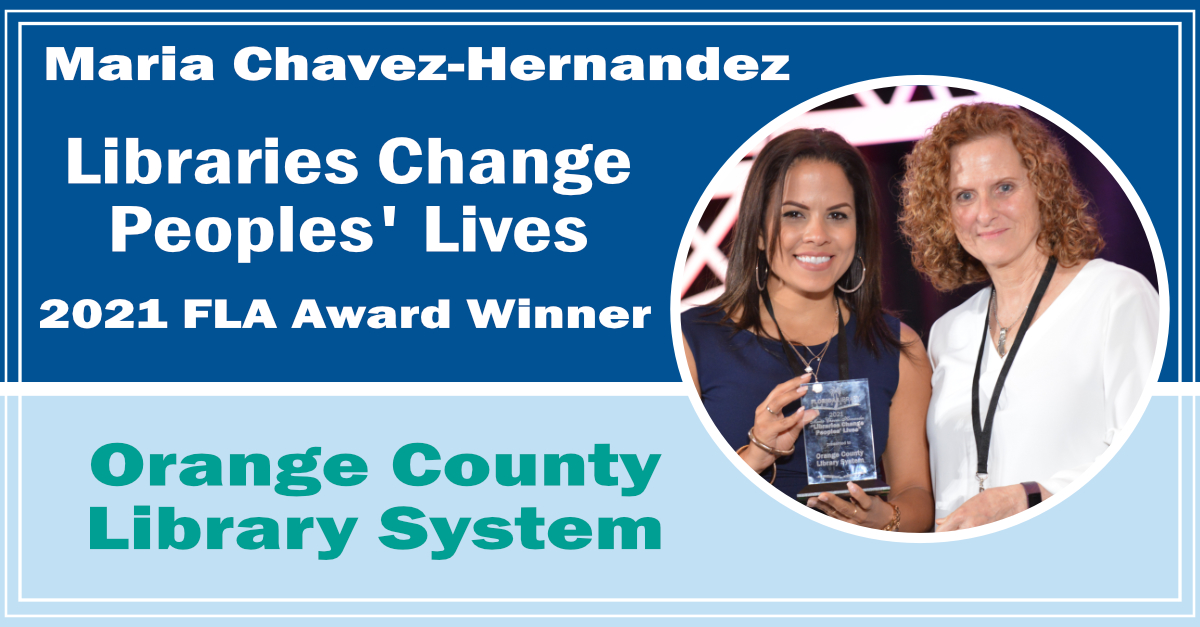- About
- Membership
- Support FLA
- Professional Development
- Advocacy
- Programs/Events
- 2025 FLA Annual Conference
- Calendar of Events
- DEIA Diversity Discussions
- Awards
- 2025 FLA Awards Information
- 2025 FLA Awards Information - Lifetime Achievement
- 2025 FLA Awards Information - Administrator of the Year
- 2025 FLA Awards Information - Librarian of the Year
- 2025 FLA Awards Information - Outstanding New Librarian
- 2025 FLA Awards Information - Outstanding Paraprofessional
- 2025 FLA Awards Information - Intellectual Freedom
- 2025 FLA Awards Information - Library of the Year
- 2025 FLA Awards Information - Innovative Program or Service
- 2025 FLA Awards Information - Communications Excellence
- 2025 FLA Awards Information - Libraries Mean Business
- 2025 FLA Awards Information - Outstanding Scholarly Contribution
- 2025 FLA Awards Information - Eileen Brunner Library Champion Award
- 2025 FLA Awards Information - Outstanding Citizen
- 2025 FLA Awards Information - Outstanding Business or Media Partner
- 2025 FLA Awards Information - Maria Chavez Hernandez ‘Libraries Change People’ Award
- 2025 FLA Awards Information - Bette Davis Miller Youth Services Award
- 2024 Award Winners
- Previous Winners
- Scholarships
- Webinars
- AI: The Future of Library Services is Here
- Succession Planning for Library Strategic Success
- Movin’ on Up: Using Bibliometrics and Altmetrics for Discoverability, Promotion and Tenure Webinar
- Research & Grant Proposal Writing 101 for Library Workers: A Basic Introduction
- Afternoon Conversation and Reading with Caridad Moro-Gronlier
- Exploring Civil Unity with Shola Richards Webinar
- 2024 Conference Keynote Speaker Webinar
- Library Conferences 101: Making the Most of Your Experience
- DEIA Webinar: Engaging with EDIA Topics
- Intellectual Freedom Webinar: Unintended Consequences
- Member Spotlight
- Connect
- Resources
|
In a county with over 1.3 million, the Orange County Library System (OCLS) plays a critical role in changing the lives of its residents. OCLS focuses on learning the needs of residents and creating ways to fulfill them and helping the community connect and grow. Approximately 38% of Orange County, FL residents are non-native speakers of English. OCLS is dedicated to meet the needs of English learners, immigrants, and underserved populations by being receptive and responsive. One success story which stands out is an ESL (English as a Second Language) program, English for Families. The library system tried to help English learners with their basic language needs by leveraging partnerships with organizations like the Adult Literacy League and the use of volunteers, but OCLS soon realized the need was too great and decided to create an ESL Specialist position in 2015 and hired Dr. Jelitza Rivera for the job. She was charged with creating a series of ESL classes tailored to meet the needs of the residents and mainstreaming them so that they could be branded and offered in different parts of the county by staff. The first step Dr. Rivera took to learn the needs of the residents was to interview and survey them. She discovered that the residents wanted classes that focused on teaching them how to speak and communicate. Therefore, the first series of classes offered by an OCLS staff member was Speaking Clearly, which focuses on pronunciation and everyday communication skills. After that first series, Dr. Rivera expanded the ESOL program by offering classes for beginner, intermediate, and advanced students, addressing speaking, listening, reading, and writing. These core classes have been offered since 2015. The program began at one branch and within 18 months, it expanded to 12 out of 15 branches throughout the system. Each branch has different demographics, so the classes are tailored to their population to ensure high interest and engagement. Since 2015, the class offerings and class varieties have increased every year to fulfill community needs. In 2018, Dr. Rivera created the family literacy program, English for Families, funded by The Florida Humanities as a response to the influx of Puerto Rican families that were forced to move to Florida after Hurricane Maria. The program focused on two main parts of literacy: fundamental vocabulary development and reading strategies. English for families brings families together through reading, activities, and games. It helps K-12 students receive additional exposure to the language, support, and instruction in English literacy. In addition, the program helps adults develop fundamental English language skills to obtain a job in Florida. In English for Families, parents and children learn and practice together. The program was launched in the Fall of 2018, averaging 15 students per class. The program was revised and offered again in the Spring and the Fall of 2019. However, in 2020, in response to closures due to COVID, English for Families was revised into virtual mode. When COVID mandatory closures began during mid-March 2020, Dr. Rivera acted quickly and revised the ESOL class curricula, including English for Families, to fit a virtual model. She created guidelines and procedures for the classes and student tutorials on distance learning. She also trained other staff to move ESL programs online. The first virtual class was held April 1st. She reached out to students, inviting them to a Zoom class. As a result of her engagement with students, the online ESOL classes grew from 5 online students to an average of 22 students per class within two months of going online. Now, the ESOL team at OCLS offers about 30 classes a week. The English for Families program’s success is measured in several ways. One method of measurement is through pretest and posttest and surveys which have revealed that students show growth in English vocabulary as well as knowledge of grammar. Dr. Rivera has documented and recorded examples of students benefiting from the program. Dr. Rivera surveyed the English for Families participants: When asked how useful the vocabulary covered in English for Families has been in their personal lives, 100% of participants answered either “extremely useful” or “very useful.” The English for Families program received a net promoter score of 85, showing that most students would recommend the program to a friend. During the English for Families virtual class of Winter 2021, one student wrote a message on the Google Classroom stream, “It was an excellent class,” while another student wrote, “I loved class. The class was prepared with love and care. Thanks you so much, teachers.” In addition to OCLS’s commitment to serving the underserved and nonnative English- speaking communities, it is also committed to helping other organization leaders and staff develop and grow their respective programs through idea sharing and training. In 2020, Dr. Rivera spoke at several seminars about distance learning and teaching English Learners during the pandemic, including ProLiteracy’s Distance Learning webinar which had approximately 700 professionals from across the nation in attendance. Proliteracy’s publication Notebook featured a section about the virtual ESOL program at OCLS under their section Lessons from the Field. Finally, to expand the English for Families program, she developed a training program for instructors and staff looking to implement the program in their organizations. As a result, in 2021, English for Families will be offered at Hillsborough County and Broward County libraries. Libraries change lives! This is evident in the work OCLS has put out to the community to help nonnative speakers and underrepresented populations as well as the work to help other organization leaders develop and expand their programs. OCLS is a paragon for how libraries change lives from the staff to the consumer and across the country. |

